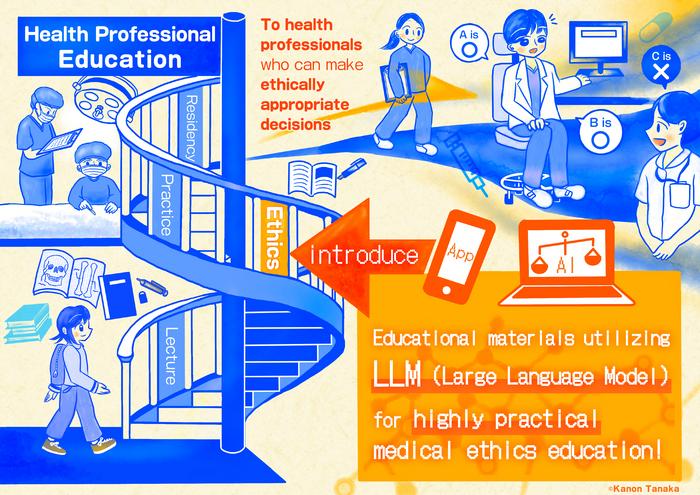In the realm of healthcare, the integration of ethical standards into medical education is increasingly recognized as a critical necessity. A recent essay by researchers from Hiroshima University emphasizes the role of large language models (LLMs), such as ChatGPT, in enhancing the teaching of medical ethics. As healthcare environments evolve with technological advancements, it’s vital for educational institutions to innovate their instructional approaches, leveraging modern tools to prepare future medical professionals adequately.
The shift towards using LLMs in medical ethics education is underscored by the recognition of these models as resources that can aid in the cultivation of moral reasoning and virtuous behavior among medical students. The researchers articulate that the conventional methods of teaching ethics often struggle to compete with the pressing demands of imparting fundamental medical knowledge and clinical skills. This competition for attention in medical curricula can inadvertently result in ethics being sidelined, with students receiving insufficient exposure to the core ethical dilemmas they will face in clinical practice.
With LLMs demonstrating impressive capabilities in empathy and understanding complex human interactions, their application in medical education is promising. These models not only have the potential to support educators in delivering content but can also simulate realistic clinical scenarios that provoke ethical discussions. The authors of the essay argue that LLMs can serve as virtual mentors, enabling students to engage more deeply with ethical principles and their applications in practice through interactive dialogue.
Moreover, the potential risks of relying too heavily on LLMs must be acknowledged and addressed. While these models provide insights and guidance, they are not a substitute for human instructors. The intricacies inherent in medical ethics—such as navigating diverse moral perspectives—require the nuanced judgment that only trained educators can offer. The researchers advocate for a blended approach that combines the strengths of LLMs with traditional teaching methods, ensuring that students benefit from both technological advancements and the human experience.
The essay’s authors point out that the utility of LLMs extends beyond simply supplementing classroom teaching. The capacity for LLMs to assist in creating interactive educational environments can revolutionize how medical ethics is approached. They can present various case studies, encourage critical thinking, and involve students in ethical problem-solving scenarios. This experiential learning model can foster a more profound understanding of the ethical considerations that medical professionals must navigate in their practice.
As LLMs continue to evolve and improve, their application within medical education presents both opportunities and challenges. Educators must remain cautiously optimistic while pursuing innovative ways to integrate these technologies. This transition calls for rigorous testing and evaluation to ascertain the effectiveness of LLMs in achieving educational outcomes in ethics.
The essay emphasizes the importance of research in this area, suggesting that further studies should explore how LLMs influence the learning of ethics and their overall impact on student preparedness for real-world challenges in healthcare. This area of inquiry could establish a new paradigm in medical education, where LLMs are strategically employed to enhance ethical literacy among students, ultimately improving patient care.
The implications of successfully integrating LLMs into medical ethics education extend beyond the classroom. As healthcare systems become more complex and digitally driven, medical professionals equipped with strong ethical foundations are vital to ensuring high standards of patient care and trust in the medical profession. The researchers call for medical schools to consider the unique opportunities that LLMs offer, fostering environments where students can explore ethical dilemmas in depth before entering clinical settings.
Furthermore, the paper notes the challenges that lie ahead. For effective integration of LLMs into the curriculum, medical educators must receive adequate training on how to utilize these tools effectively. Without proper guidance, the potential of LLMs to improve medical ethics education may not be fully realized. Faculty development programs should be implemented alongside technological innovations to ensure that educators can adapt to this new landscape of teaching.
The crucial balance between technological advancements and ethical responsibility comes to the forefront of this discussion. While LLMs can provide valuable insights and support learning, they must not be viewed as infallible sources of knowledge. A critical approach to evaluating the advice and information provided by LLMs should be instilled in students from the outset, encouraging them to question, analyze, and understand the constraints and capabilities of these tools.
In conclusion, the essay by Hiroshima University researchers is a clarion call for medical schools to leverage LLMs in enhancing medical ethics education. By addressing the current shortcomings in ethics instruction and embracing innovations, educational institutions can better equip future healthcare professionals to face the ethical complexities of modern medicine. This pathway can ultimately contribute to the cultivation of a more ethically aware and socially responsible healthcare workforce, fostering a culture of ethical reflection and moral courage within the profession.
Embracing these advancements does not only prepare students for their immediate academic challenges but also instills in them the lifelong skills required to navigate the evolving landscape of medical ethics in an age increasingly shaped by technology.
Subject of Research: Integration of large language models in medical ethics education.
Article Title: AI-based medical ethics education: examining the potential of large language models as a tool for virtue cultivation.
News Publication Date: 5-Feb-2025.
Web References: BMC Medical Education, Author’s Profile – Tsutomu Sawai.
References: Frontiers in Psychology.
Image Credits: Kanon Tanaka.
Keywords: Medical ethics, Large language models, Education innovation, Empathy in healthcare, AI in medical education.




